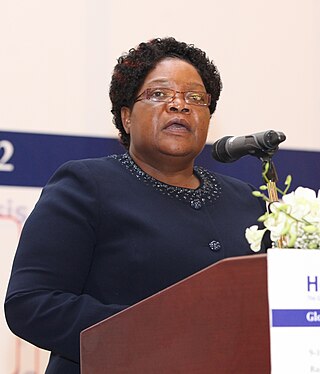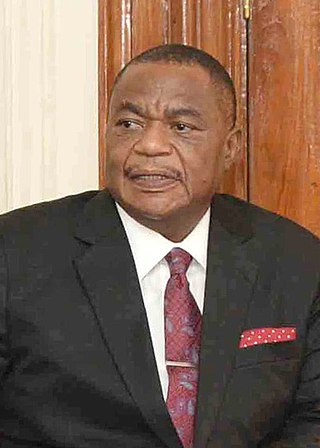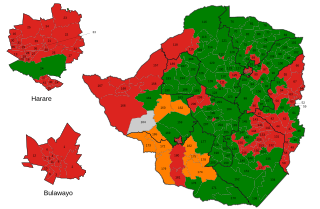Related Research Articles

The politics of Zimbabwe occurs in a society deeply divided along lines of race, ethnicity, gender and geography. The ZANU–PF party has historically been dominant in Zimbabwe politics. The party, which was led by Robert Mugabe from 1980 to 2017, has used the powers of the state to intimidate, imprison and otherwise hobble political opposition in Zimbabwe, as well as use state funds and state media to advance the interests of the party.

The Zimbabwe African National Union – Patriotic Front (ZANU–PF) is a political organisation which has been the ruling party of Zimbabwe since independence in 1980. The party was led for many years under Robert Mugabe, first as prime minister with the Zimbabwe African National Union (ZANU) and then as president from 1987 after the merger with the Zimbabwe African People's Union (ZAPU) and retaining the name ZANU–PF, until 2017, when he was removed as leader.

Josiah Magama Tongogara was a prominent Zimbabwean guerrilla commander during Rhodesian Bush War. He was the brother of the current Zimbabwean President Emmerson Mnangagwa's first wife, Jayne. He attended the Lancaster House conference that led to Zimbabwe's independence and the end of white minority rule.

Joice Runaida Mujuru, also known by her nom-de-guerre Teurai Ropa Nhongo, is a Zimbabwean revolutionary and politician who served as Vice-President of Zimbabwe from 2004 to 2014. Previously she had served as a government minister. She also served as Vice-President of ZANU–PF. She was married to Solomon Mujuru until his death in 2011 and was long considered a potential successor to President Robert Mugabe, but in 2014 she was denounced for allegedly plotting against Mugabe. As a result of the accusations against her, Mujuru lost both her post as Vice-President and her position in the party leadership. She was expelled from the party a few months later, after which she formed the new Zimbabwe People First party.
Jonathan Nathaniel Mlevu Moyo is a Zimbabwean politician who served in the government of Zimbabwe as Minister of Higher Education from 2015 to 2017. He was previously Minister of Information and Publicity from 2000 to 2005 and again from 2013 to 2015. He was elected to the House of Assembly of Zimbabwe as an independent candidate in 2005 and 2008. He is considered the core architect of the AIPPA and POSA restrictive legislation.
Operation Murambatsvina, also officially known as Operation Restore Order, was a large-scale Zimbabwean government campaign to forcibly clear slum areas across the country. The campaign started in 2005 and according to United Nations estimates has affected at least 700,000 people directly through loss of their homes or livelihood and thus could have indirectly affected around 2.4 million people. Robert Mugabe and other government officials characterised the operation as a crackdown against illegal housing and commercial activities, and as an effort to reduce the risk of the spread of infectious disease in these areas.
Enos Mzombi Nkala was one of the founders of the Zimbabwe African National Union.

There were widespread reports of systematic and escalating violations of human rights in Zimbabwe under the regime of Robert Mugabe and his party, ZANU-PF, between 1980 and 2017.
Geoffrey Nyarota is a Zimbabwean journalist and human rights activist. Born in colonial Southern Rhodesia, he trained as a teacher before beginning his career with a Zimbabwean state-owned newspaper, The Herald. As editor of the state-owned Bulawayo Chronicle in 1989, he helped to break the "Willowgate" scandal, which resulted in several resignations from the cabinet of President Robert Mugabe.
Lovemore Madhuku is a Zimbabwean politician and democracy activist who is best known for being one of the founding members of the National Constituent Assembly or NCA, a pro-democracy group. An active civil society worker, Madhuku served as NCA's President from 2001 to 2011. During his tenure as the President, he aimed at bringing forth a new autonomous constitution in Zimbabwe that would get rid of the one-party rule of Robert Mugabe, President of Zimbabwe since 1987. The highlight of his career came when the NCA successfully defeated a constitution introduced by Mugabe in the national referendum in 2000. Ever since Madhuku has been trying to bring to an end the autocratic rule and establish a democratic constitution in Zimbabwe. He attained his degree in law from the University of Zimbabwe and later did his doctorate degree from the University of Cambridge. He has been appointed as a full-time professor at the University of Zimbabwe since 2011. Madhuku penned the famous textbook, 'An Introduction to Zimbabwean Law' which gives an insight into Zimbabwean legal system

The Herald is a state-owned daily propaganda newspaper published in Harare, the capital of Zimbabwe.
The Daily News is a Zimbabwean independent newspaper published in Harare. It was founded in 1999 by Geoffrey Nyarota, a former editor of the Bulawayo Chronicle. Bearing the motto "Telling it like it is", the Daily News swiftly became Zimbabwe's most popular newspaper. However, the paper also suffered two bombings, allegedly by Zimbabwean security forces. Nyarota was arrested six times and reportedly was the target of a government assassination plot. After being forced from the paper by new management in December 2002, Nyarota left Zimbabwe. The News was banned by the government in September 2003.
The media of Zimbabwe has varying amounts of control by successive governments, coming under tight restriction in recent years by the government of Robert Mugabe, particularly during the growing economic and political crisis in the country. The Zimbabwean constitution promotes freedom of the media and expression, however this is hampered by interference and the implementation of strict media laws. In its 2008 report, Reporters Without Borders ranked the Zimbabwean media as 151st out of 173.

Constantino Chiwenga, is a Zimbabwean politician and former army general currently serving, since 2017, as the First Vice-President of Zimbabwe under President Emmerson Mnangagwa. In August 2020, he added the Health Ministry to his portfolio.
Willowvale is the name of an industrial suburb in the South West of Harare, Zimbabwe. The area was a popular suburb for working class Southern European immigrants in the post war era but today is home to mostly black Zimbabweans and the descendants of Malawian, Mozambiquean and Zambian immigrants.

The Chronicle is a popular daily newspaper in Zimbabwe. It is published in Bulawayo and mostly reports on news in the Matebeleland region in the southern part of the country. It is state-owned and therefore usually only publishes news that supports the government and its policies. It also covers stories on national and international news, as well as entertainment, sport, business, travel, job offers and real estate. It was established in 1894 and it was the largest newspaper in the country following The Herald.
Willowgate was a 1988–89 political scandal in Zimbabwe involving the illegal resale of automobile purchases by various government officials, uncovered by The Bulawayo Chronicle. The ensuing investigation resulted in the resignations of five members of President Robert Mugabe's cabinet. One of the five, Maurice Nyagumbo, later committed suicide after being charged with perjury. The reporters who had broken the story, Geoffrey Nyarota and Davison Maruziva, were subsequently removed from their posts.
Basildon Peta was the second journalist ever to be awarded the Media Institute of Southern Africa's Press Freedom Award for his reporting in Zimbabwe. In his homeland, Peta was persecuted and he fled for his life after receiving threats from the Robert Mugabe regime in 2001 and incurring a brief detainment in Harare before the April 2002 elections. Since his exile in February 2002 to South Africa, Peta has reported for newspapers in the United Kingdom and New Zealand. He currently writes editorials and is the owner of a newspaper publishing company in Maseru, Lesotho.

General elections were held in Zimbabwe on 29 March 2008 to elect the President and Parliament. Because of Zimbabwe's dire economic situation, the elections were expected to provide incumbent President Robert Mugabe with his toughest electoral challenge to date. Mugabe's opponents were critical of the handling of the electoral process, and the government was accused of planning to rig the election. Human Rights Watch said that the election was likely to be "deeply flawed."
Zimbabwe Newspapers (1980) Limited, operating as Zimpapers, is a state-controlled Zimbabwean mass media company. Originally a newspaper Publishing company, in the 2010s it expanded its operations to include commercial printing, radio and television. The company's portfolio includes over a dozen Magazines and newspapers, including The Herald and The Chronicle, several radio stations, and a television network. It is the largest newspaper publisher in Zimbabwe.
References
- 1 2 3 Jane Perlez (20 January 1989). "Zimbabwe Reads of Officials' Secrets". The New York Times. Archived from the original on 2 February 2016. Retrieved 12 September 2012.
- 1 2 Karl Maier (15 April 1989). "3 Cabinet Ministers Quit in Zimbabwe as Corruption Report Is Published". The Washington Post. Archived from the original on 2 February 2016. Retrieved 12 September 2012.
- 1 2 3 "Zimbabwe Crisis: Foreign journalist held over newspaper bomb". The Independent. 28 April 2000. Archived from the original on 8 December 2012. Retrieved 12 September 2012.
- ↑ P.P. Jackson (2010). Shattered Dreams. AuthorHouse. pp. 52–3. ISBN 9781452043944 . Retrieved 12 September 2012.
- 1 2 "Pressure grows on independent media". The Sydney Morning Herald. 3 January 2003. Archived from the original on 4 July 2009. Retrieved 12 September 2012.
- ↑ Lewis Machipisa (1 April 1999). "New Independent Daily Launched". Inter-Press Service. Archived from the original on 12 March 2016. Retrieved 12 September 2012.
- ↑ Karen Breytenbach (12 June 2007). "Acclaimed Zim journalist pens harrowing, moving memoirs". Cape Times.[ dead link ]
- 1 2 Winston W. Wiley (24 December 2006). "A defiant voice: African journalist delivers news from afar". Telegram & Gazette. Archived from the original on 20 December 2013. Retrieved 12 September 2012.
- ↑ "Geoffrey Nyarota: a defiant voice". CNN. 16 August 2001. Archived from the original on 8 September 2012. Retrieved 12 September 2012.
- 1 2 "International Press Freedom Awards 2001". Committee to Protect Journalists. Archived from the original on 28 August 2012. Retrieved 11 August 2012.
- ↑ Steven Tsoroti (20 November 2001). "Independent Newspaper Battles Closure". worldpress.org. Archived from the original on 16 September 2012. Retrieved 12 September 2012.
- ↑ "Geoffrey Nyarota, Zimbabwe". World Association of Newspapers. Archived from the original on 10 May 2012. Retrieved 12 September 2012.
- ↑ "Around the World". The Washington Post. 9 May 2008. Archived from the original on 15 April 2016. Retrieved 12 September 2012.
- ↑ Nelson Banya (8 May 2008). "Opinion piece gets editor in trouble". Independent Online. Archived from the original on 21 April 2013. Retrieved 12 September 2012.
- ↑ Angus Shaw (8 May 2008). "Zimbabwe lawyer and editor arrested, 40,000 farm workers displaced". Associated Press. Archived from the original on 15 April 2016. Retrieved 12 September 2012.
- ↑ Tsvangirayi Mukwazhi (8 October 2008). "Zimbabwe Media". Associated Press. Archived from the original on 9 April 2016. Retrieved 12 September 2012.